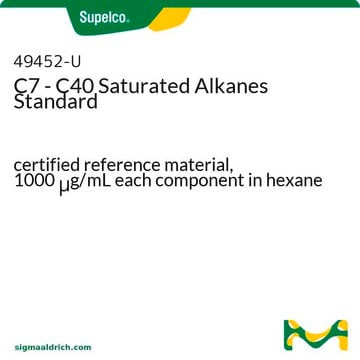About This Item
Recommended Products
grade
analytical standard
Quality Level
vapor density
5.96 (vs air)
vapor pressure
1 mmHg ( 47.8 °C)
Assay
≥99.8% (GC)
autoignition temp.
401 °F
shelf life
limited shelf life, expiry date on the label
technique(s)
HPLC: suitable
gas chromatography (GC): suitable
refractive index
n20/D 1.421 (lit.)
n20/D 1.421
bp
215-217 °C (lit.)
mp
−9.6 °C (lit.)
density
0.75 g/mL at 25 °C (lit.)
application(s)
cleaning products
cosmetics
flavors and fragrances
food and beverages
personal care
format
neat
SMILES string
CCCCCCCCCCCC
InChI
1S/C12H26/c1-3-5-7-9-11-12-10-8-6-4-2/h3-12H2,1-2H3
InChI key
SNRUBQQJIBEYMU-UHFFFAOYSA-N
Looking for similar products? Visit Product Comparison Guide
General description
Application
- Simultaneous determination of volatile organic compounds by gas chromatography
- Determination of seven volatile organic compounds in the surgically resected colonic tissue samples of colorectal cancer patients by gas chromatography-mass spectrometry (GC-MS) following their extraction by headspace- and direct injection- based solid phase microextraction (SPME)
- Measurement of concentrations of volatile organic compounds (VOCs) in biogas samples obtained from three different biogas plants by gas chromatography-mass spectrometry
- Quantification of 29 organic air pollutants, consisting of alkanes, carbonyls, terpenes, and aromatic hydrocarbons, in the indoor air of 22 houses using passive samplers
- Gas chromatography-mass spectrometry (GC-MS) method-based profiling of volatile organic compounds in the olive fruit headspace extracts
Other Notes
Signal Word
Danger
Hazard Statements
Precautionary Statements
Hazard Classifications
Asp. Tox. 1
Supplementary Hazards
Storage Class Code
10 - Combustible liquids
WGK
WGK 1
Flash Point(F)
158.0 °F - Pensky-Martens closed cup
Flash Point(C)
70 °C - Pensky-Martens closed cup
Personal Protective Equipment
Choose from one of the most recent versions:
Already Own This Product?
Find documentation for the products that you have recently purchased in the Document Library.
Customers Also Viewed
Protocols
Separation of Decane; Dodecane; Tetradecane; Hexadecane; Octadecane; Eicosane; Docosane; Tetracosane; Hexacosane; Octacosane
Our team of scientists has experience in all areas of research including Life Science, Material Science, Chemical Synthesis, Chromatography, Analytical and many others.
Contact Technical Service









